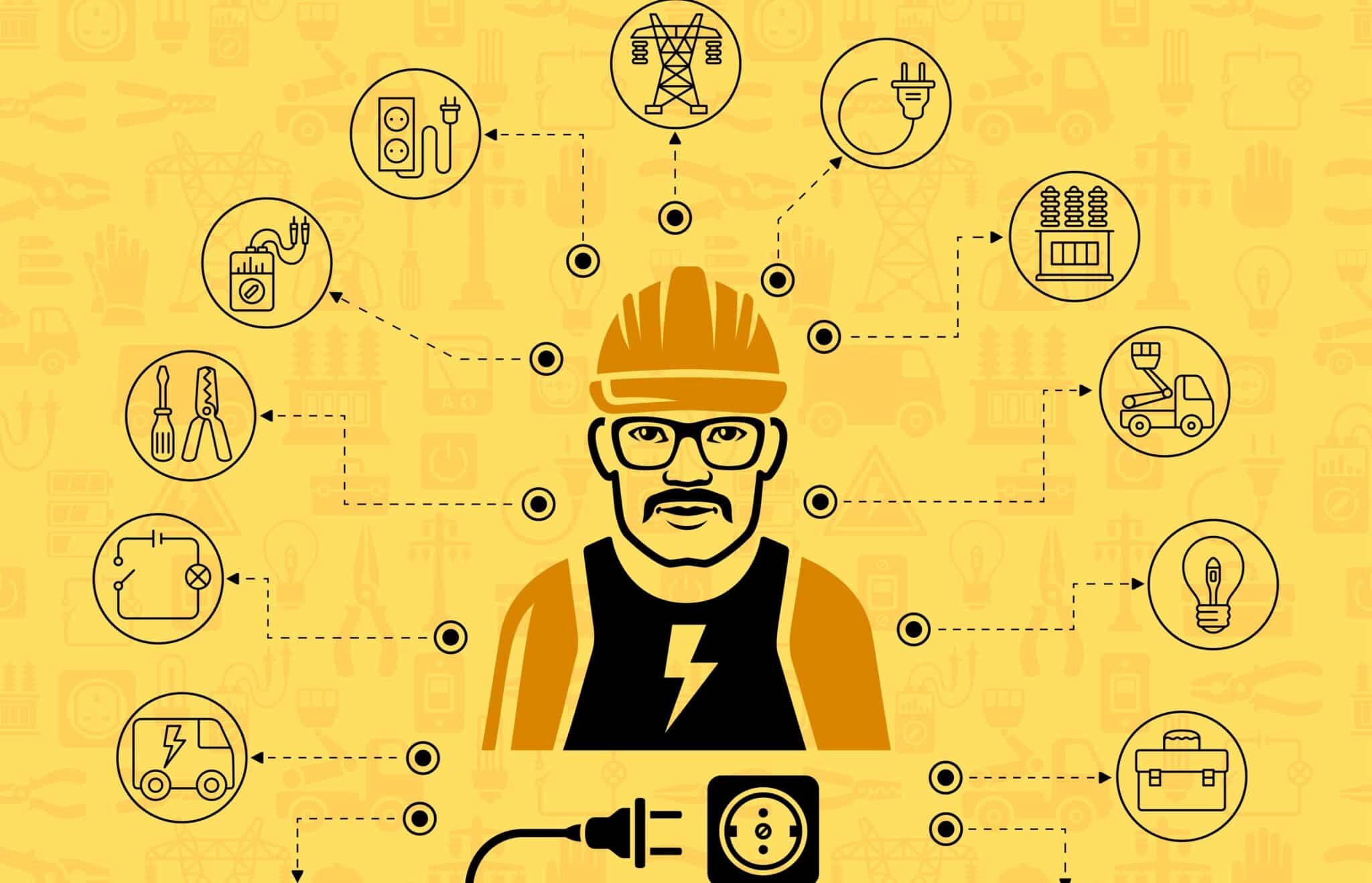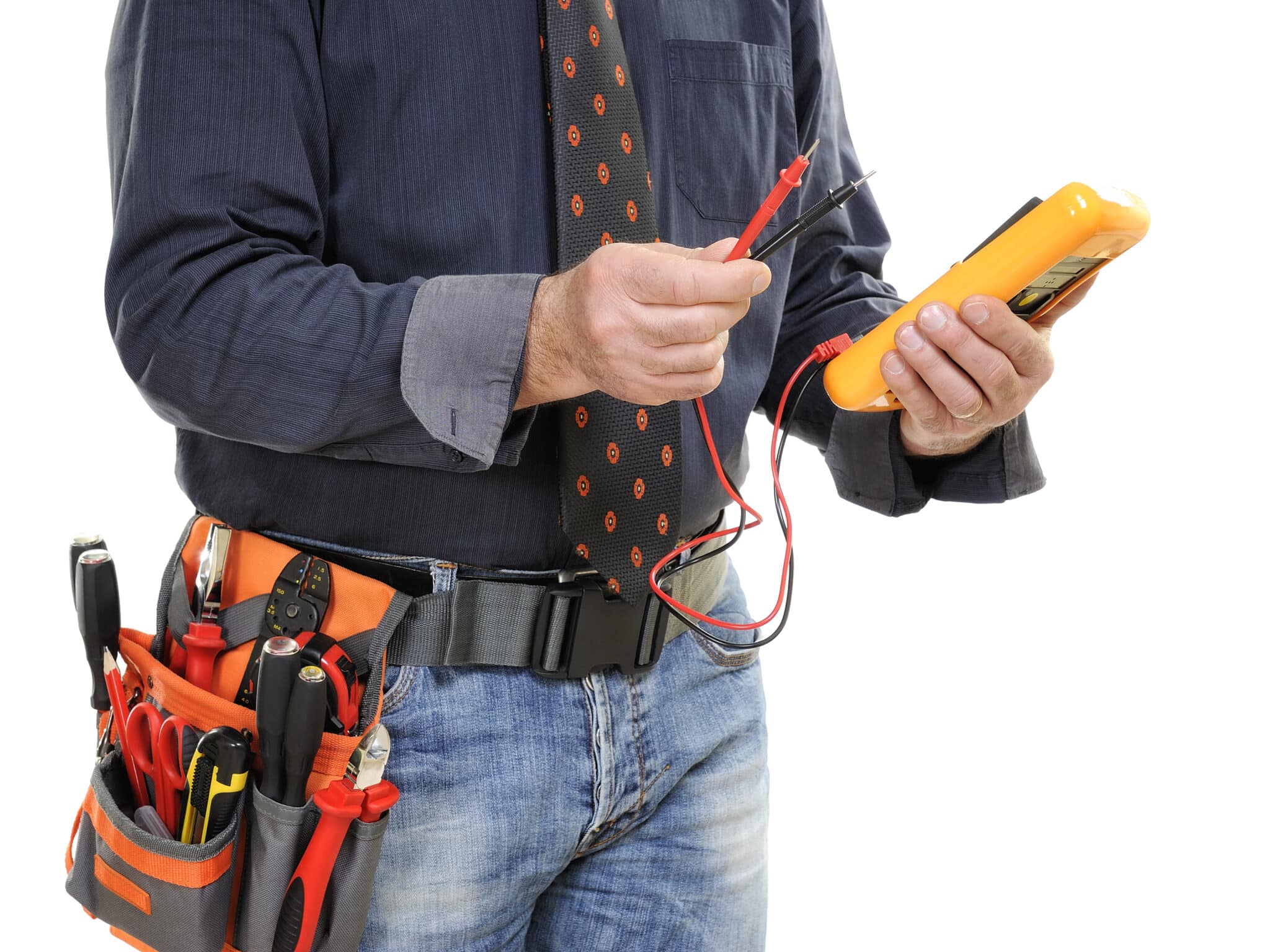
Electrical Safety Tips – Have you ever experienced a sudden flicker of lights or the smell of burning wires in your home? These could be warning signs of electrical hazards lurking within your walls.
Electrical safety is not just for professionals; understanding and implementing some simple electrical safety tips can make a big difference in protecting your home and loved ones.
From recognizing common electrical problems to following best practices for device safety, this guide will help you ensure a safe and hazard-free home environment.

Understanding Electrical Hazards at Home
Common Electrical Hazards in Homes
Many households face common electrical hazards that can be easily overlooked. These include faulty wiring, outdated electrical systems, and overloaded circuits. Each of these issues can lead to severe consequences, such as electrical shocks or fires.
For instance, old or damaged wires can heat up and ignite. It’s essential to regularly inspect your home’s wiring to prevent these dangers.
Signs of Electrical Problems
Being aware of the signs of electrical problems can help you catch issues early. Look out for flickering lights, burning smells, and frequently tripping circuit breakers.
Hearing strange noises from your outlets can also be a red flag. If you notice any of these signs, it’s time to take action. Ignoring these warnings can lead to more severe and costly issues.
Best Practices for Electrical Safety
Turn Off Power Before Work
Before you start any electrical work, always turn off the power. This step is crucial to prevent electric shocks or other injuries. Even something as simple as changing a light bulb should be done with the power off.
Always double-check that the power is truly off before proceeding. Using a voltage tester can help ensure your safety.
Proper Use of Extension Cords
Extension cords are handy, but improper use can be dangerous. Always use extension cords that are rated for the appliance or tool you are connecting.
Overloading cords can cause them to overheat and potentially start a fire. Never use damaged or frayed extension cords. It’s also a good idea to avoid running cords under carpets or rugs.
Avoid Overloading Outlets
Overloading electrical outlets can lead to serious problems. Each outlet is designed to handle a certain amount of power, and exceeding that can cause overheating. Use power strips with built-in circuit breakers to manage your electrical load.
Spread out your devices across multiple outlets if possible. This simple practice can help prevent fires and other hazards.
Electrical Device Safety
Inspecting and Replacing Damaged Cords
Always inspect your cords for any signs of damage before use. Frayed or cracked cords can lead to electrical shocks or fires.
If you find any damage, replace the cord immediately instead of trying to repair it. Using damaged cords is a significant risk. Regular checks can help you catch problems early.
Safe Usage of Power Strips
Power strips are convenient, but they must be used correctly to ensure safety. Only plug-in devices that do not exceed the strip’s maximum load. Avoid daisy-chaining multiple power strips together, as this can create an overload.
Make sure the power strip has an internal circuit breaker for added protection. Place power strips in well-ventilated areas to prevent overheating.
Maintaining Air Circulation for Appliances
Proper air circulation around your appliances is essential to prevent overheating. Ensure that vents and fans are not blocked by dust or other objects. Overheating can cause devices to malfunction or even catch fire.
Regularly clean the areas around your appliances to keep them in good working order. This simple maintenance step can help extend the life of your appliances.
Child Safety Measures
Installing Outlet Covers
One of the simplest yet most effective ways to protect children is by installing outlet covers. These covers prevent kids from sticking fingers or objects into electrical outlets.
Outlet covers are easy to install and provide a strong barrier against accidental shocks. Make sure to choose covers that are difficult for children to remove. This small investment can significantly enhance safety in your home.
Teaching Kids About Electrical Safety
Educating your children about the dangers of electricity is crucial. Explain to them why they should never touch electrical outlets, cords, or appliances without adult supervision. Use age-appropriate language to make the lessons clear and memorable.
Reinforcing these lessons regularly helps kids remember and follow them. This proactive approach can prevent accidents before they happen.
Keeping Dangerous Appliances Out of Reach
Always keep dangerous appliances out of children’s reach. This includes items like hairdryers, toasters, and electric kettles. Store these appliances in high cabinets or locked drawers.
When in use, ensure they are placed far from the edge of the counters. This practice reduces the risk of children accidentally pulling them down or getting injured.

Regular Maintenance and Inspections
Checking Outlet Temperatures
Regularly check the temperature of your outlets. Warm or hot outlets can indicate an overloaded circuit or faulty wiring.
Use the back of your hand to feel the outlet cover. If it’s warm, unplug any devices and consult an electrician. Catching these issues early can prevent more significant problems down the line.
Investigating Flickering Lights
Flickering lights can be a sign of various electrical issues, from loose bulbs to more severe wiring problems. If tightening the bulb doesn’t fix the flicker, it’s time to investigate further.
Check for loose connections or consult a professional if the problem persists. Ignoring flickering lights can lead to larger, more dangerous electrical failures.
Ensuring Correct Wattage for Fixtures
Using the correct wattage for your light fixtures is essential. Overloading a fixture with a bulb of higher wattage than recommended can cause overheating.
Always check the fixture’s maximum wattage rating and use bulbs accordingly. This simple step can help prevent fires and extend the life of your fixtures.
Safety Enhancements for Your Home
Installing Ground Fault Circuit Interrupters (GFCIs)
Ground Fault Circuit Interrupters (GFCIs) are crucial safety devices that protect against electrical shock. They detect imbalances in electrical current and shut off power before it can cause harm.
Install GFCIs in areas where water and electricity might meet, such as bathrooms, kitchens, and outdoor outlets.
This small upgrade can prevent serious injuries and save lives. Following these electrical safety tips can make a significant difference in your home’s overall safety.
Using Arc-Fault Circuit Interrupters (AFCIs)
Arc-Fault Circuit Interrupters (AFCIs) help prevent electrical fires by detecting dangerous arcing conditions. These devices are especially useful in older homes with outdated wiring.
AFCIs can identify and interrupt faulty electrical arcs that standard circuit breakers might miss. Consider upgrading your circuit breakers to AFCIs for enhanced safety. Implementing these electrical safety tips can greatly reduce the risk of electrical fires in your home.
Professional Electrical Inspections
Regular professional electrical inspections are essential for maintaining a safe home. An experienced electrician can identify and address potential hazards that might go unnoticed by the untrained eye.
Schedule inspections at least once a year to ensure your electrical system is in good working order. This proactive approach can help you avoid costly repairs and dangerous situations.
Among the top electrical safety tips, this one ensures that any underlying issues are promptly addressed.
Preventing Electrical Fires
Appropriate Fire Extinguishers
Having the right fire extinguishers on hand is essential for dealing with electrical fires. Not all fire extinguishers are suitable for electrical fires; you need one that is rated for Class C fires.
Keep an extinguisher in easily accessible locations, such as the kitchen and near major electrical equipment. This precaution is one of the most critical electrical safety tips for immediate response to a fire.
Managing Heat-Producing Appliances
Appliances that produce heat, like space heaters and ovens, need special attention. Ensure they are placed away from flammable materials and used according to the manufacturer’s instructions.
Never leave heat-producing appliances unattended while in use. Following these electrical safety tips can help you avoid potential fire hazards.
Keeping Flammable Materials Away from Electrical Sources
Keep flammable materials, such as paper, cloth, and cleaning supplies, away from electrical outlets and devices. Clutter around electrical sources can easily catch fire if there is a spark or overheating.
Regularly inspect areas around outlets and appliances to ensure they are free of flammable items. These simple yet effective electrical safety tips can prevent many fire-related incidents.
Water and Electricity Safety
Keeping Electrical Devices Away from Water
Always keep electrical devices away from water sources such as sinks, bathtubs, and pools. Even a small amount of water can cause serious electrical shocks or damage to your devices.
Ensure that any outlets near water sources are equipped with Ground Fault Circuit Interrupters (GFCIs). These practices are fundamental electrical safety tips for avoiding dangerous situations.
Remember, one of the most important electrical safety tips is to create a safe distance between water and electricity.
Safe Handling of Wet Appliances
If an electrical appliance gets wet, do not use it until it has been thoroughly inspected by a professional. Unplug the device immediately and let it dry completely before attempting to use it again.
Using a wet appliance can result in electric shocks or fires. Adhering to these electrical safety tips can save you from potential accidents and device damage.
Another crucial electrical safety tip is to ensure appliances are entirely dry before use to prevent any electrical mishaps.
Using Waterproof Covers for Outdoor Outlets
For outdoor outlets, use waterproof covers to protect them from rain and moisture. These covers prevent water from getting into the outlets, reducing the risk of short circuits and electrical shocks.
Regularly check the condition of these covers and replace them if they are damaged. These simple electrical safety tips help maintain safe outdoor electrical use.
It’s also important to regularly inspect these covers as part of your routine electrical safety tips to ensure they are in good condition.
Preparing for Severe Weather
Electrical Safety During Storms
During storms, it’s crucial to unplug electrical devices to protect them from power surges. Lightning can cause significant damage to your home’s electrical system. Unplugging devices can prevent this damage and keep your home safer.
Another important electrical safety tip is to avoid using electrical appliances during a storm to reduce the risk of shocks. Keeping these electrical safety tips in mind can help you safeguard your devices and home during inclement weather.
Generator Safety Tips
Using a generator during power outages can be a lifesaver, but it’s essential to follow proper electrical safety tips to ensure its safe operation. Here are some crucial points to keep in mind:
- Operate Generators Outdoors: Always use generators in well-ventilated areas to avoid carbon monoxide poisoning.
- Avoid Direct Connections: Never connect a generator directly to your home’s wiring unless you have a professionally installed transfer switch. This prevents backfeeding, which can be hazardous to utility workers.
- Follow Manufacturer’s Instructions: Always adhere to the manufacturer’s guidelines for safe operation.
Incorporating these generator-specific electrical safety tips can ensure the safe and efficient use of your backup power source, keeping you and your family safe during power outages.
Securing Outdoor Electrical Equipment
Before severe weather hits, secure or bring inside any outdoor electrical equipment. This includes items like extension cords, lighting, and garden tools. Water and debris can damage this equipment, leading to electrical hazards.
Following these electrical safety tips helps protect both your equipment and your home’s electrical system. Regularly practicing these electrical safety tips ensures your outdoor equipment remains safe and functional during harsh weather conditions.
Safe Installation Practices
Hiring a Qualified Electrician
When it comes to significant electrical work, always hire a qualified electrician. Professionals have the training and experience to handle complex electrical tasks safely and effectively.
Attempting to do this work yourself can be risky and lead to potential hazards. Following these electrical safety tips ensures that your installations are done correctly and safely.
DIY Tips for Minor Electrical Tasks
For minor electrical tasks, such as changing light fixtures or installing new outlets, follow basic electrical safety tips. Always turn off the power at the breaker box before starting any work.
Use the proper tools and make sure you understand the task at hand. Never attempt DIY electrical work if you are unsure about the process. Sticking to these electrical safety tips can help you complete minor tasks safely.
Using the Correct Materials
Using the correct materials and components for electrical installations is crucial. Ensure that all wires, outlets, and fixtures are rated for their intended use. Using incorrect materials can lead to overheating and electrical fires.
Always follow the manufacturer’s guidelines and local electrical codes. This essential electrical safety tip helps maintain a safe and efficient electrical system in your home.
Ensure Your Home’s Safety with Expert Help!
Worried about your home’s electrical safety? Don’t leave it to chance! Mister Sparky Of East Texas is here to provide professional electrical inspections and services in Longview, TX, and Lindale, TX.
Our experienced electricians can help you implement essential electrical safety tips to keep your home safe and secure. Whether you need a routine check-up or have specific concerns, we’ve got you covered.
Contact us today at 903-218-4757 to schedule an appointment and take the first step towards a safer home. Your family’s safety is our top priority!
FAQs
What should I do if an outlet feels hot?
If an outlet feels hot to the touch, unplug all devices immediately and stop using it. Contact a qualified electrician to inspect the outlet. Using an overheated outlet can lead to electrical fires. Following this electrical safety tip is crucial to prevent home hazards.
How can I prevent overloading circuits?
To prevent overloading circuits, spread your electrical devices across multiple outlets and use power strips with built-in circuit breakers. Avoid plugging too many high-wattage appliances into one outlet. These electrical safety tips help distribute electrical load evenly and reduce the risk of fires.
When should I call a professional electrician?
Call a professional electrician if you notice signs of electrical problems, such as flickering lights or burning smells. For major electrical work or installations, always hire a professional. This electrical safety tip ensures that electrical work is done safely.
Are extension cords safe for permanent use?
Extension cords are not safe for permanent use as they can overheat and cause fires. Install additional outlets for permanent solutions. This electrical safety tip helps avoid the risks associated with over-reliance on extension cords.
How can I childproof my home against electrical hazards?
To childproof your home, install outlet covers, keep electrical cords out of reach, and educate your children about the dangers of electricity. Regularly inspect for potential hazards and follow essential electrical safety tips to ensure a safe environment for your kids.









